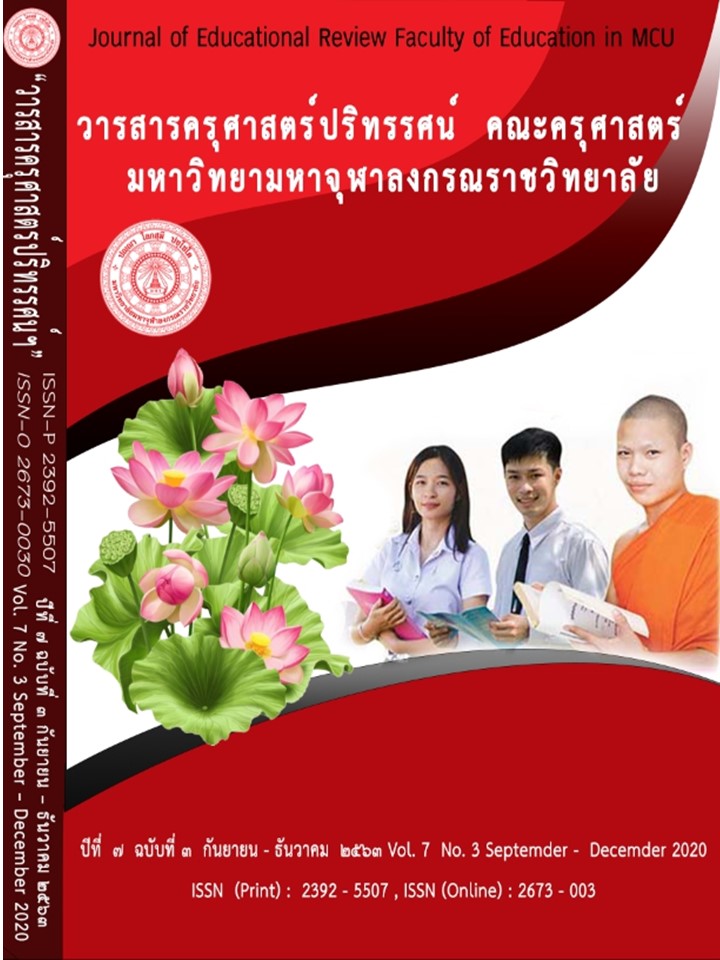EFFECTIVE MODEL OF TRANSFORMATION FOR LEADERSHIP DEVELOPMENT BASED ON FORMAL BUDDHADHAMMA PRINCIPLES OF SCHOOL ADMINISTRATORS BASIC EDUCATION
Main Article Content
Abstract
The purpose of this research paper was 1) to analyze the components of effective model of transformation for leadership development based on Formal Buddhadhamma principles. 2) to create effective model of transformation for leadership development based on Formal Buddhadhamma principles. 3) to assess effective model of transformation for leadership development based on Formal Buddhadhamma principles of School Administrators Basic Education. The methodology used in this study was Mixed Method and was divided into three phases. 1) on the analysis components of effective model of transformation for leadership development based on Formal Buddhadhamma principles, the researcher examines the documents, concepts, theories and opinions from specialists. Interview was the research tool which used to evaluate the significance from 10 specialists and monks. To find out the components of effective model of transformation for leadership development based on Formal Buddhadhamma principles.The effective transformational leadership development on Formal Buddhadhamma principles. “PCA” was used to analyze the data in the Exploratory Factor Analysis to survey key elements from a sample of 588 population 2) to create effective model of transformation for leadership development based on Formal Buddhadhamma principles of School Administrators Basic Education. In order to measure the suitability of the model, the connoisseurship was used among 12 informants including monks.3) to assess effective model of transformation for leadership development based on Formal Buddhadhamma principles of School Administrators Basic Education, the model was assessed by 15 specialists for accuracy, suitability, possibility and benefits. The research results revealed that : 1)The components of effective model of transformation for leadership development based on Formal Buddhadhamma principles contain 8 elements including, (1) Technical Skill (2) Honest (3) Attentive Monitoring (4) Conceptual Skill (5) Human Relation Skill (6) Moderation (7) Community Relations (8) Knowing oneself 2) The model contains 4 sections including (1) introduction (2) aims and development approach (3)development process (4) success conditions, which are accordance with the conceptual framework of the research. and 3) The assessment of a model effective transformational leadership development on Formal Buddhadhamma principles of School Administrators Basic Education include accuracy, suitability, possibility, benefit. The overall were highest level in all aspects.
Article Details
ทัศนะและความคิดเห็นที่ปรากฏในบทความในวารสารฉบับนี้ถือเป็นความรับผิดชอบของผู้เขียนบทความนั้นเพียงผู้เดียว และไม่ถือเป็นทัศนะและความรับผิดชอบของกองบรรณาธิการ
กองบรรณาธิการขอสงวนสิทธิ์ในการคัดเลือกบทความลงตีพิมพ์และจะแจ้งให้เจ้าของบทความทราบหลังจากผู้ประเมินบทความตรวจอ่านบทความแล้ว
ต้นฉบับที่ได้รับการตีพิมพ์ในวารสารครุศาสตร์ปริทรรศน์ คณะครุศาสตร์ มหาวิทยาลัยมหาจุฬาลงกรณราชวิทยาลัย ถือเป็นกรรมสิทธิ์ของคณะครุศาสตร์ มหาวิทยาลัยมหาจุฬาลงกรณราชวิทยาลัย ห้ามนำข้อความทั้งหมดหรือบางส่วนไปพิมพ์ซ้ำ เว้นเสียแต่ว่าจะได้รับอนุญาตจากมหาวิทยาลัยฯ เป็นลายลักษณ์อักษร
References
กระทรวงศึกษาธิการ. (2546). พระราชบัญญัติการศึกษาแห่งชาติพ.ศ. 2542 และที่แก้ไขเพิ่มเติม (ฉบับที่ 2) พ.ศ. 2545 พร้อมกฎกระทรวงที่เกี่ยวข้อง และพระราชบัญญัติการศึกษาภาคบังคับ พ.ศ. 2545. กรุงเทพมหานคร: องค์การรับส่งสินค้าและพัสดุภัณฑ์.
คณะอนุกรรมการจัดทำองค์ความรู้เกี่ยวกับรัฐธรรมนูญแห่งราชอาณาจักรไทย ในคณะกรรมการบริหารจัดการความรู้ของสำนักงานเลขาธิการสภาผู้แทนราษฎร (2560). องค์ความรู้เกี่ยวกับรัฐธรรมนูญแห่งราชอาณาจักรไทย และองค์ความรู้เกี่ยวกับการจัดทำรัฐธรรมนูญ ฉบับสมุดไทย. กรุงเทพมหานคร: สำนักงานเลขาธิการสภาผู้แทนราษฎร.
ชิต ปุริโสดม. (2552). งานบริหารการศึกษา. นครศรีธรรมราช: คณะครุศาสตร์ มหาวิทยาลัยราชภัฏนครศรีธรรมราช.
ณัฐนิภา คุปรัตน์. (2550). นักบริหารการศึกษาในศตวรรษที่ 21. วิทยาจารย์. 106. 76-79.
บรรจง เจริญสุข. (2552). การพัฒนารูปแบบการบริหารสถานศึกษาตามหลักธรรมาภิบาลในสถานศึกษาขั้นพื้นฐานเขตจังหวัดภาคใต้ตอนบน. ดุษฎีนิพนธ์ปรัชญาดุษฎีบัณฑิต. มหาวิทยาลัยรามคำแหง.
พระเทพปริยัติเมธี. (2553). ภาวะผู้นำเชิงพุทธกับการจัดการความขัดแย้งในสังคมไทย. รายงานการวิจัย. มหาวิทยาลัยมหาจุฬาลงกรณราชวิทยาลัย.
พระธรรมโกศาจารย์ (ประยูร ธมฺมจิตโต). (2549). พุทธวิธีบริหาร. กรุงเทพมหานคร: มหาจุฬาลงกรณราชวิทยาลัย.
พระมหาสำรวย ภูริเมธี (ชาวดร). (2559). รูปแบบการพัฒนาภาวะผู้นำการเปลี่ยนแปลงทางการศึกษาเชิงพุทธบูรณาการ. ดุษฎีนิพนธ์พุทธศาสตรดุษฎีบัณฑิต. มหาวิทยาลัยมหาจุฬาลงกรณราชวิทยาลัย.
สมุทร ชำนาญ. (2546). การพัฒนารูปแบบการบริหารโรงเรียนที่บริหารโดยใช้โรงเรียนเป็นฐาน. ดุษฎีนิพนธ์การศึกษาดุษฎีบัณฑิต. มหาวิทยาลัยบูรพา.
สำนักคณะกรรมการการศึกษาแห่งชาติ. (2542). พระราชบัญญัติการศึกษาแห่งชาติ พ.ศ. 2542. กรุงเทพมหานคร: พริกหวานกราฟฟิก.
สำนักงานรับรองมาตรฐานและประเมินคุณภาพการศึกษา (องค์การมหาชน). (2554). คู่มือการประเมินคุณภาพภายนอกรอบสาม (พ.ศ. 2554-2558) ระดับการศึกษาขั้นพื้นฐานฉบับทดสอบทางการศึกษา. สมุทรปราการ: ออฟเซ็ทพลัส.
Bass, Bernard M. and Bruce J. Avolio. (1994) Improving Organization Effectiveness Through Transformational Leadership. California: Sage Publications.
Gibson James L. Ivancevich John M. and Donnelly James H. (2000). Organization: Behavior Structure Process. 10 the d. Boston: McGraw – Hill Inc.
Hair J.F., Black W.C., Babin B.J., Anderson R.E., and Tatham R.L. (2006). Multivariate data analysis. 6th ed. New Jersey: Pearson Prentice Hall.
Joyce B. and Weil M. (1996). Model of Teaching. New York: Prentice-Hall.
Kuhnert, K.W., & Lewis, P. (1987). Transactional and Transformational leadership: A Constructive development analysis. Academy of Management Review. 12
Robert V. Krejcie and Earyle W. Morgan. (1970). Educational and sychological Measurement. Boston: PWS – KENT publishing companypp.


